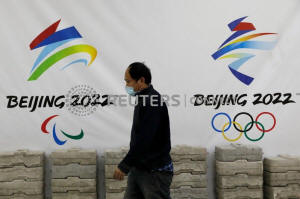|
With calls for a boycott growing over China's
human rights record, State Department spokesman Ned Price
repeated concerns over what Washington has described as genocide
against Uighur Muslims in the northwestern Xinjiang region,
where Beijing denies that rights abuses have taken place.
Asked if the United States was consulting allies over whether to
consider a potential joint boycott, Price told a media briefing:
"It is something that we certainly wish to discuss...
"We understand that a coordinated approach will be not only in
our interests, but also in the interests of our allies and
partners."
Price later clarified in an email that he was referring to the
United States having a coordinated approach rather than
specifically discussing a joint boycott.
He subsequently wrote in a tweet that there was nothing new to
announce. "2022 remains a ways off, but we will continue to
consult closely with allies and partners to define our common
concerns and establish our shared approach to (China)."
A Chinese foreign ministry spokesman said the idea of a boycott
went against the spirit of the Olympic charter and hurt
athletes' interests. "International society will not accept
(it)" Zhao Lijian told a news conference in Beijing on
Wednesday.
The White House said in February that it had not made a final
decision on whether the United States would take part, and would
look for guidance from the International Olympic Committee
(IOC), which had no comment.
Human rights groups have urged the IOC to take the Olympics out
of China because of its treatment of Uighur Muslims along with
other human rights concerns.
An independent U.N. panel said in 2018 that it had received
credible reports that at least 1 million Uighurs and other
Muslims had been held in camps in Xinjiang.
Beijing describes them as "vocational training centers" to stamp
out extremism, and denies accusations of abuse.
The Biden administration has signaled that it has no plans to
bar U.S. athletes from participating in the Beijing Games, a
move discouraged by the U.S. Olympic and Paralympic Committee.
But Washington and allies could still push for a diplomatic
boycott in which officials do not attend.
The last U.S. Olympic boycott came in 1980 when President Jimmy
Carter refused to send American athletes to the Moscow Olympics
amid Cold War tensions surrounding the Soviet invasion of
Afghanistan.
(Reporting by Humeyra Pamuk, Simon Lewis, David Brunnstrom and
Gabriel Crossley; editing by Jonathan Oatis and John Stonestreet)
[© 2021 Thomson Reuters. All rights
reserved.] Copyright 2021 Reuters. All rights reserved. This material may not be published,
broadcast, rewritten or redistributed.
Thompson Reuters is solely responsible for this content. |
|






